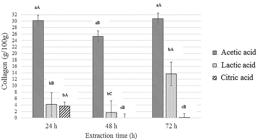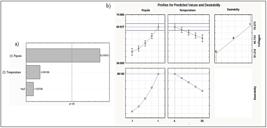Abstract
The aim of this study was to investigate the effect of acid pretreatment, temperature and enzyme concentration on the acid-enzymatic extraction of soluble collagen from chicken keel bone cartilage. A chemical composition analysis and protein profile characterization of this slaughter by-product were also conducted. The cartilages were extracted with 0.5 mol/L of acetic, lactic and citric acids for 24, 48 and 72 hours. Subsequently, optimization with a 22 factorial design was performed with three replications at the central point for a total of 7 experiments; the analyzed response was the collagen content of the obtained isolates. The cartilage under study has a high protein content (90.27% dry basis) consisting of approximately 35.7% collagen and is a source of essential and predominantly hydrophobic amino acids. Pretreatment with acetic acid for 24 hours led to greater extraction potential and consequently, a better collagen yield (30.12%). The electrophoretic profile of the obtained collagens revealed the existence of an α1 chain, indicating that this collagen was type II. Statistical analysis demonstrated that the acid-enzymatic procedure favored a temperature of 30 °C.
Keywords:
acid pretreatment; by-product; chicken keel bone cartilage; pepsin-soluble collagen; temperature

 Thumbnail
Thumbnail
 Thumbnail
Thumbnail
 Thumbnail
Thumbnail


